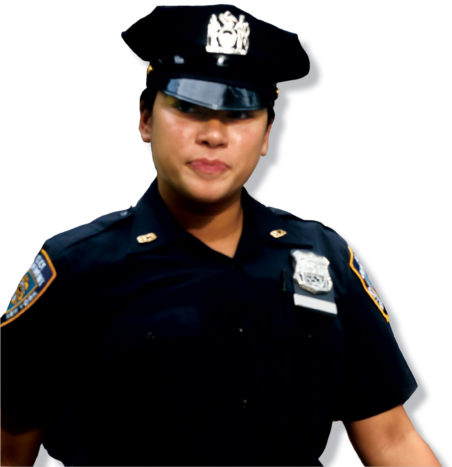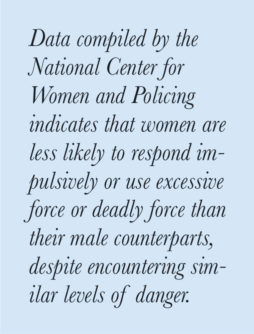
Photo from iStockphotos
The lack of racial and ethnic diversity in law enforcement made headlines in 2020. Social as well as broadcast media engaged in well-deserved criticism of public safety departments across the U.S. Far more pronounced than the lack of racial and ethnic diversity, however, is the absence of gender parity in law enforcement. This rarely makes headlines or the talk show circuit and seems to be an accepted norm by the general public.
The City of Aurora appointed its first woman Police Chief, Vanessa Wilson, in 2020. She is the exception that proves the rule. As of July 2020, women represented only 14% of Denver’s police force, a figure that aligns with the national average. Chief Paul Pazen told KDVR in a July 2020 interview that he was encouraged by a new class of cadets at the Denver Police Academy that was 31% female and said DPD had set a goal of 30% women on the force by 2030.1
2030 is three decades into the twenty-first century! And even this lofty goal is not close to representative. A criminology professor quoted in the KDVR article pointed out that women officers are better at exploring options rather than making impulsive decisions; this quality alone is vital to good policing. So why aren’t women coming into or staying in law enforcement despite the skills they could bring to so many situations faced by police?
 Sexism and Reprisals
Sexism and Reprisals
“I’m the only female on my detail. I get questioned every time I’m making a decision,” says one police officer. After well over two decades in public safety, male colleagues with much less experience still question her decisions because of her gender, she says.
Multiple experienced and successful women officers from around the metro area were interviewed for this article. All are passionate about their work and committed to serving the public, but say the work culture does not support women. They are not referring to questions of family leave or work-life balance. They are referring to insidious enduring sexism and a culture that punishes women who speak out.
This article includes no identifying factors like agency, department or rank to protect the women from reprisals for speaking out. Their words reflect almost a century of collective experience and overlap in many places. Each officer peppers her interview with multiple examples of demotions, transfers, and other punitive measures taken against female colleagues who spoke out against sexual harassment, professional incompetence, and disrespect by male subordinates.
Some of these tactics were the subject of a civil rights complaint that the Denver Police Department settled for $280,000 in 2020.2 That complaint contended that the department was “rife with sexism, including at the highest levels.” In response to her formal complaint, then-District Commander Magen Dodge was moved to a different, isolated position. This is one way whistleblowers within law enforcement are silenced, according to officers interviewed.
“I’ve been bullied, and I’ve been harassed,” says one officer. The women sharing these very serious concerns are not “disgruntled former employees.” They are long-time public servants who remain passionate about their profession and frequently refer to it as “a calling.” They say things like “I don’t work for my sergeant. I don’t work for my lieutenant. I don’t work for the Chief….I work for the citizens.” But they say that the pervasive culture of law enforcement does not support women who voice their concerns or women in authority generally.
One officer reflects how different her career would be if she were a man. “They would love me because I would be a man’s man and a cop’s cop…I am assertive and I know the rules and regulations, I hold people accountable.” But as a woman, “they will not stand for it.” As reflected in Dodge’s complaint, all the officers interviewed say that outspoken female officers are relocated or demoted and replaced with less experienced or less competent women who are not considered threatening.
“Bright, New and Shiny” vs. “Stay Focused. You’re a Cop.”
It seems there are always women who will stay silent and comply with the existing culture. These typically younger, less experienced “bright, new and shiny” officers are complicit for the sake of job security and a possible promotion. The women interviewed believe that replacing outspoken women with women who play along is how departments avoid EEOC complaints, making it hard to prove gender bias and hold anyone accountable.
“We still have females…who are sleeping their way to the top…and show as much cleavage as they can get away with,” says one officer. They laugh at men’s jokes and use their “feminine wiles” to their advantage, but they do not stand up to a culture that ostracizes and punishes women who refuse to play the game, the officers concur.
“Stay focused. You’re a cop” says one officer of the newbies who play into the “Madonna and Whore dichotomy.” As they fulfill the stereotypes, they hold back change for women as a whole, the officers suggest.
Lack of female mentorship is another problem, the officers confide. One likens the competition for the limited spots allotted women, to “crawdads that are trying to get out of the bucket…and they pull each other down.”
At its foundation, these problems begin with recruitment and hiring practices. “We can’t just put people in a position that they haven’t been drawn to, that it’s not been a calling for them or they’re not qualified for.” Several cite the screening process and the quality of those recruited, which begins with the Civil Service Commission. “Don’t recruit a Black guy because he’s Black. Recruit a young Black man that has wanted to be a cop since he was a little boy.”
Not everyone is called to do this work, they agree. “I wanted to be an officer because I saw the relationship between my community and the police department just going downhill, and I said ‘Well, the only way to make a difference is to get in there and make a change.’ Not a lot of people feel that way,” she says. Those who come in drawn by the salary “tap out like the fourth year.”
The consensus is that good officers view this career path as a calling, not a job. Some enter law enforcement thinking, “Let me do this for four or five years and then I’ll quit and do something else.” That is not what makes for a great officer. To endure, they say, “You have to be willing to be smarter than the b.s. that happens and really decide that you’re going to make it your career.”
Why Does It Matter?
If we want to promote better policing and ensure that our public safety departments respond effectively to community needs, our departments need to look like the community. Data compiled by the National Center for Women and Policing indicates that women are less likely to respond impulsively or use excessive force or deadly force than their male counterparts, despite encountering similar levels of danger. That means a happier public and fewer lawsuits and fewer $280,000 settlements. “Recruiting & Retaining Women—A Self-Assessment Guide for Law Enforcement” is a manual published by that organization.3
One seasoned officer reflects on her years of service, including multiple promotions, and says, “I went through it [gender bias] my entire career. If I had my exact same personality and I was male, I would be executive staff.” Diversity hiring fairs will not succeed in bringing more women into a field that remains stuck in outdated and sexist notions.
2 https://www.denverpost.com/2020/03/20/denver-police-gender-discrimination-complaint/




0 Comments